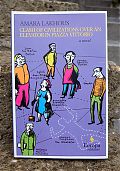
Amara Lakhous
Clash of Civilizations over an Elevator in Piazza Vittorio
Mama mia! Only until I had the book in hand was I able to recite that title, a title much thicker than the book itself. Though I’ve never forgotten Piazza Vittorio and how a five minute walk down via Farini transported me to a Rome transformed. In Piazza Vittorio one can eat samosas fresh fried, buy chopsticks and rice noodles and tofu and vegetables I have no name for. In Piazza Vittorio it is no longer Italia per Italiani but Italia per tutti quanti!
No wonder in interviews, Amara Lakhous says that he has often observed something in Piazza Vittorio that occurred elsewhere in Rome, but much later. What happens when you amass transplanted cultures together—on a spectrum far away from the UN? Maybe, Italian comedy.
We had a long discussion about reality in Italian movies, and I strongly defended Italian comedy, which often takes on serious and sad subjects in a comic manner.
Clash of Civilizations over an Elevator in Piazza Vittorio is set in Piazza Vittorio, Rome, in an apartment building where a murder has taken place in the much disputed over elevator. The tenants give their testimony, defending Amedeo, whose tape recorded—and randomly dated—journal entries alternate with these first person narrations. As would be expected, we meet a serious range of characters.
If I have learned anything about the Romans it is that they are proud to be Roman, proud of their Romanaccio dialect, proud of their football whether Roma or Lazio. A Neapolitan will say Rome is in the North and a Milanese will say its in the South; Italians are easily divided, but what they all seem to agree on is Immigration. Just ask anyone: There are too many Romanians! Ask any North American: too many Mexicans!
Immigration is a touchy subject, it can be serious and sad. As I’ve quoted above, Clash of Civilizations over an Elevator in Piazza Vittorio, is a comedy; through tenants’ testimony the reader catches glimpses of immigration’s varied opinions that often oppose each other. Illustrated brilliantly by the topic that no one can agree on: Is Amedeo an immigrant? His Italian is superb, he knows Rome better than long-time Romans, the truth for him is not necessary, the past is something to move away from. Other immigrants don’t believe that he is an immigrant. He has either absorbed completely, or stands so far outside the “stereotype” that it ceases to exist.
And it brings up the most interesting question: Who is Roman anyway? Who is Italian? Who is any nationality, really? Around the basins of mesopotamia civilizations have always crowded; it has little to do with where you come from, where you’re going. I know from myself, my movement and my life make a much more suitable definition than any land mass I am in or have left.
Then there is the translation: it sucks. On the book’s back flap L’espresso praises Lakhous’ use of Neapolitan dialect and Roman slang. These were obviously only in the Italian edition for any translation of regional expressions that Anna Goldstein has made, have been rendered flat. Flat as in boring, flat as in monotone, flat as in the opposite of spoken Italian.
A good translation captures the poetry of a language in another language. Because a language has a feel, when rendering, say, Russian into English, the English text won’t “feel” English as much as it “feels” Russian. Everyday I listen to Italian, I laugh at the multifarious expressions and the ridiculous transliterations such words as Porco Madonna! would make. Porco Madonna. I can’t think of a similar expression in the English language, unless one likes the way “Pig Holy Mother!” rolls from the tongue.
No matter, this thin book rises above the poor translation. I’ve been thinking about gifting it (the Italian version) to some good Romans who would do well to think about other’s thoughts and opinions on Immigration.
Commentary for Clash of Civilizations over an Elevator in Piazza Vittorio
· · · · · · · · · · · · · · · · · · · ·
1 On Sunday 31 July 2011 Vincent wrote:
If I were translating Porco Madonna I would leave it untranslated. One of my current projects is a new English translation of Camus’ Le Mythe de Sisyphe, a philosophical essay which needs to be read as it was written, urgently and with passion. So I set myself the task of writing it as Camus would have written it if he could think in English. Even though my version is in idiomatic English as far as possible, it still feels French, I think.